The Middle East and particularly Saudi Arabia, was my life for more than ten years.
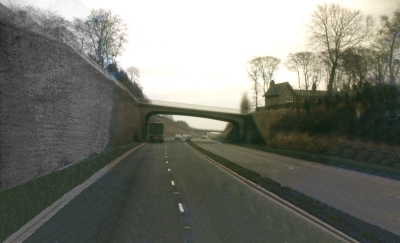
John on A63 to Hull
I started on overland driving Pete Robbins’ Scania 140 in January 1976. Pete had a Scania 140 and a 111, which was newer and which he drove himself. He was a member of Mike Conlong’s ‘Nodag’. A peculiar sounding acronym for ‘Northern Owner Drivers’ Associated Group’. The office at the time was in my home town of Barrow in Furness, just because Mike lived nearby.
First trip was to Syria. Television equipment for a transmission station in Homs, but clearing first in Damascus. My brother Andy drove Mike Conlong’s Scania 110, also going to Homs, and there were about 5 other Nodag members we met on the Hull – Rotterdam ferry going to other points eastward, including Qatar and Teheran. The ferry was back on – roll off. We were among the first to embark, a long way back in quite a dark hold. The stevedores had no patience with anyone who wasn’t proficient. Luckily we both had seven years’ experience on artics, so it presented no problem. Later as we were eating our inclusive meal, we listened to one driver regaling everyone with his tale of how he always made sure that he was last on, so he didn’t have far to reverse and also he would be first off at Europoort at the other end.
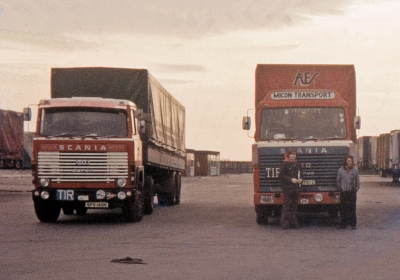
John with GFV & KRM at Hull docks, with Davies Turner driver – Andy taking the photo
In the morning we cleared Dutch customs. Although I’d done a fair bit of European, it had been simple T-Forms. This was our first experience of TIR. One of the officials asked Andy if he had his T-Forms (I assume that this was for the red diesel in the belly tank). Andy replied ‘If I need them, I’ve got them!’
We stopped at a garage to buy snow chains. Andy already had a pair of big doubles. I think we just bought singles and hoped that we wouldn’t need them. There were the ‘hairy’ clogs for sale at the Dutch garages, but we had no money to spare for such frivolities! Andy did overland longer than me and later became the proud owner of a pair.
We were booked on the ’Deutsche Bundesbahn Kombiverkehr’ from Cologne to Munich, so after Customs and ‘tankscheins’ at the border we left the E40 autobahn at the Knapsack sign and went round three sides of a square to get back to the Eifeltor yard. There was a huge level crossing over at least 10 sets of tracks halfway round, which was apparently later replaced with a tunnel. We drove onto the train, then had to clamp the truck wheels with big heavy chocks. One of the drivers remarked that he’d seen a brochure with the happy, smiling DB workers doing that.
After we had loaded, I received a phone call, which was to say the least unusual. It was Mike Conlong. Our father, who had been in hospital after having a thrombosis in the leg, had died. No credit cards then and really no way of returning for the funeral. It was a sombre train ride.
At Munich, the rest of the Nodag crew piled into the Beerkeller. It was seven a.m. and snowing heavily. Andy and I didn’t drink much and wanted to get on. The last thing I needed at that time was a pint of beer. However, since the others were ‘old hands’ with several trips under their belts, we were reluctant to set off on our own. After Andy and I made a couple of forays into the pub, it was clear that they weren’t going anywhere. Andy and I were very frustrated to wait a day, but we bowed to their better judgement. ‘It’s snowing, come in and have a drink!’ We didn’t. In addition to the Nodag crew were ‘The Big Men’. This was a father and son who between them weighed about 50 stone and drove brown Volvos signwritten with ‘Bunnor Asian’. The father drove a roadtrain and the son had an artic I think. I met them several times in the coming months, at odd times, as you did with ‘overlanders’.
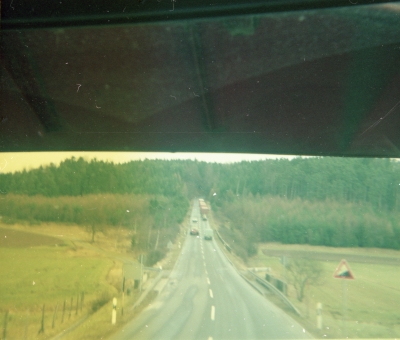
John following the ‘Convoy’, West Germany
We eventually all set off together next morning. We were on East European permits, so headed for the Czech border. As we drove through West Germany, there were signposts with the American Forces Network radio station dial settings. It was good to hear CW McCall’s ‘Convoy’ for the first time and the DJ’s total bewilderment that Laurel and Hardy were at number one in the UK, with ‘On the trail of the lonesome pine.’ ‘What do they smoke over there?’ He asked.
The radio news also had the historic first commercial take off of Concorde, live. The Brits to Bahrain and the French to Rio. The good old Yanks were running a dog-in-the-manger campaign to keep us out of JFK, the obvious natural journey destination. I flew home on Concorde from Bahrain in 1979, just because I could.
Because it was winter, it was dark by 5.00pm and because the weather was so bad, John Hallibone and the other old hands were packing up at 6.00p.m.- then of course heading for the pub. Andy and I had no spare money for pub meals or drinks – we ate in the cab, read our books and went to bed. In the mornings, the rest of the crew had hangovers and were reluctant to get going.
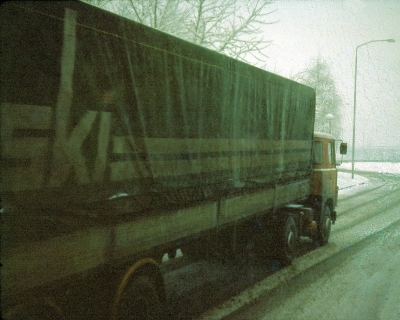
John in GFV at National Hotel, Beograd, Yugoslavia
Europe was in the grip of icy winter. We had our first shower since the ferry at the National Hotel in Belgrade – we didn’t have a room, but they had a shower block in the parking area. There were no night heaters then, and I slept in my clothes, so we got pretty smelly!
I Googled Kapikule out of interest while writing this and see that it is a modern looking drive through border crossing now. It wasn’t in 1976, it was a sea of mud with hundreds of trucks parked up in each direction trying to get through. The sole purpose of this place was to extract as much money as possible from anyone wanting to cross. After we finally cleared and were getting back on to the road I had to pull over to allow someone in the opposite direction through. I got over just too far. The truck started to slide sideways down the slimy embankment. I stopped as I could feel the drive wheels jackknifing down the slope and the cab was at a nightmare angle. Luckily, Andy had a 30 foot length of thick wire rope and was able to pull me back onto the hard road again. By this time, my clothes and the inside of the cab were coated with thick brown mud.
Altogether, it took us ten days to get to the Mocamp in Istanbul. When the rest of the lads were again nursing hangovers the next morning, Andy and I had had enough and decided to set off on our own. It was still snowing. Guards were stationed along the Bosphorus bridge. Why, I can’t imagine? It was rumoured that the bridge had been built by a British company and they hadn’t been paid for it. Perhaps they were guarding against repatriation. That must have been the most miserable job in the world.
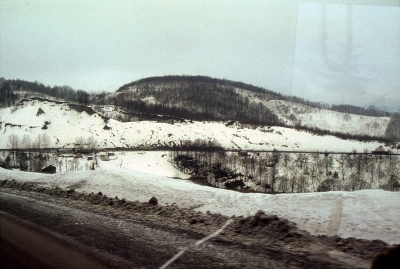
Bolu Plateau
By the time we reached Bolu mountain, the snow was heavier and starting to stick. How easy it had been to fit the snow chains in England. Lay them down on the ground, roll back over them, pull them up round the wheels, U-Clamp them together, dead easy.
A completely different proposition at -10°, when you couldn’t take your gloves off or you’d stick to the chains and the truck wanted to slide off the side of the road if you had only put the handbrake on and hadn’t locked the trailer brakes! The Turkish Fargo and Ford Tonkas were going past us, some with chains on, some without. All blowing their horns at us for blocking the road.
After struggling with the double chains, which seemed now too short to go round the wheels, for about an hour, although they’d fitted fine at home, we decided to try just a single chain, meant for the steering axle, on one of the double wheels on my truck. That was still difficult, but it went on. We fitted one on Andy’s . We set off, diff locks engaged, and climbed away like that, one wheel carrying the whole truck. Strangely, the snow eased off around about the large cafe on the left hand side about half way up and we were able to get the chains off.
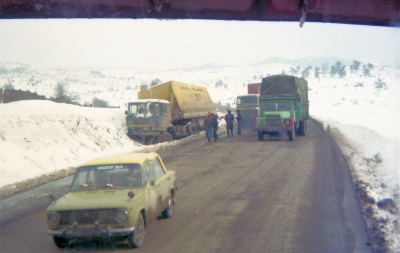
Dutch truck AndyI tried to tow out, Bolu plateau
On the plateau at the top of Bolu, a Dutchman in a Daf had gone into the ditch at the side of the road. The cab was at an oblique angle. Andy again took out his wire rope, but all he did was spin the wheels on the Scania, the Daf was stuck firmly into the Turkish mountain.
We gave up and carried on through to the Ankara Mocamp for the night.
Europe had been very cold, many truckers were lighting small bonfires under their trucks in the mornings, to remove the wax from the diesel. Another trick which some recommended was one gallon of petrol to fifty gallons of diesel. Others said don’t try this at any cost – you paid your money and took your choice! Luckily for Andy and me, the Scanias seemed to start and run OK – I guess Winters are pretty cold in Sweden, they maybe had experience of where to run the pipes?
Turkey was extremely cold, maybe -20° at night. I remember stopping at a garage and breathing out heavily and watching a shower of tiny ice crystals drop to the ground.
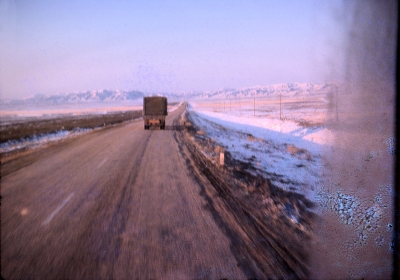
John near Sereflikoçhisar, near Tuz Golu, central Turkey – water damage to photo
Next morning we set off across the Anatolian plains, stopping for a cup of tea by ‘Tuz Golu’ a milky white, ethereal looking salt lake, the size of a sea, with a mist hanging over it like the ‘Mort d’Arthur’.
Dad had owned furniture vans and trucks through the war and up to nationalisation in about 1950, so he was always interested in our trucks. There was so much that I wanted to tell him about, and now I never could.
We passed through Aksaray. (I think they have an International football team now, but I remember it as a small town in the middle of nowhere.) From Ulukisla, the road dropped down until we were in the bottom of the river valley at the Northern side of the Tarsus Mountains.
Here, at the side of the road, was a Carmans Brit European driver, pulled over on a wide bit, fixing a puncture. We stopped to help him and discussed the journey so far. He was a nice guy and thanked us for our help.
Going over Tarsus was a nightmare. It was starting to get dark when we set off and the road was narrow, twisting and steep. It was very crowded, particularly with the ‘Tellikelle’ diesel tonkas, empty and pushing in our direction and loaded and slow from the refinery at Iskenderun in the other. To add to this, a great deal of diesel had spilled or dripped on to the road. All in all, a lethal combination. Luckily it was dry, God knows what it was like in the wet. A dual carriageway was being built on the other side of the river, but it was nowhere near finished. Once over the top, braking was a dangerous option, it was safer to try and just use the correct gear, but all the time the tonkas were pushing you from behind and overtaking absolutely anywhere. At every bend the Armco was twisted and broken where someone had gone through to crash in the valley below. There simply wasn’t room for an artic in each direction on the hairpins. Luckily, most of the tonkas were six wheelers.
For some reason the Turks would flash their main beam as they approached you, blinding you at the very moment you needed to see most clearly. I found this infuriating and I’ve never figured it out, but they all did it!
We eventually made it to the ‘Oryx’ garage owned by Astran, at Adana, at about 10pm. We were knackered. As we were eating our evening meal in my cab, John Hallibone pulled up next to us. He had also escaped the pack at Istanbul, although he hadn’t set off as early as us.
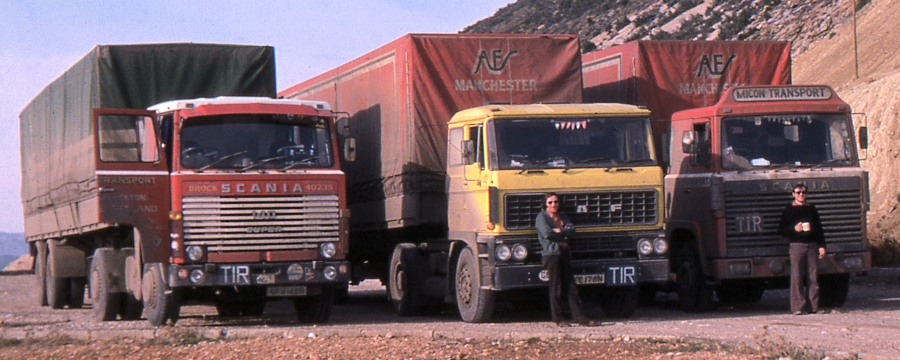
John Hallibone & Andrew West with GFV140N, GFE176N & KRM731L, nr Belen, southern Turkey
Waking up next morning, we had gone from Winter to Summer overnight. The sun shone, it was about 20° with palm trees swaying in the breeze. What a joy. We splashed out on breakfast at the Oryx cafe since we’d had to buy Turkish Lira at the border and hadn’t spent it on anything. Here we learned that we’d picked up brownie points with the Carmans driver who had reported to the Astran contingent that we were doing well for a couple of rookies. We set off round the end of the Mediterranean, passing a crusader castle perched upon a hill. We went past Iskenderun, then made the long climb over Kizil Dagii to the Syrian border at Çilvegozu. This was pronounced something like Jillveggohzoo by the Turks, but was known to all truckers as Silver Gazoo.
I understand that the ‘Young Turks’ were a political movement, prominent from the beginning of the 20th Century until the end of the First World War. To us truckers, ‘Young Turk’ always seemed to be a clearing agent at the Turkish borders. John Hallibone took over at Silver Gazoo. ‘Give me your carnets and triptychs and I’ll get them into Young Turk.’
Meanwhile Andy and I walked up to the ‘Duty Free Shops’ area. If you have an image in your mind of a large hall, similar to Heathrow Airport, you’d be mistaken. This was a row of wooden huts, next to the road, open at the front like market stalls, lit by gas lamps, not electricity. We had bought cigarettes at Kapikule, the received wisdom being that they were the ideal bribe in all situations, but even though neither of us smoked, they had all gone now. This included one packet to a particularly persistent man on a motorcycle. On one of our tea break stops, a motorcycle pulled over. The man immediately started begging for cigarettes. What made it unusual to us was that he had his wife and three children on the bike. The smallest was on the handlebars and two others between him and his wife. How could we refuse!
We asked the Cigarette sellers if they took Pounds. They said no. We later realised that Lira means Pound in Turkish, and we should have said Sterling. However, Britain had sunk so low in 1976 that every penny we took abroad had to be entered into our passports and it hadn’t surprised us that they didn’t seem to want our ‘Third World’ currency.
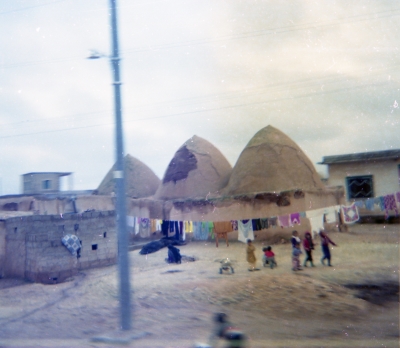
Beehive houses near Bab-El-Hawa, with children who came begging for cigarettes
John came back with our papers and we proceeded up the valley to the Syrian side, Bab–el–Hawa, Gate of the Wind. There were ancient sandstone ruins here, including an arched gate, next to the customs area. I could somehow imagine Ottoman troops advancing up that very same road in earlier centuries.
A couple of Turkish Tonkas were stopped in no-man’s-land, heaving rocks into the back of their trucks. We couldn’t figure it out, but it must have been some sort of weight fiddle.
The customs area itself was mundane, just a muddy parking area with single storey rendered offices. John introduced us to Mahmood Awad, a cigar smoking Syrian with several gold teeth and a huge belly, dressed in a crumpled western suit. His office was a Portakabin.
Although our ultimate clearance was to be in Damascus, we still had to clear into Syria. The papers were taken into Aleppo by Mahmood Awad’s man and returned next day.
While we were waiting to clear, three other ‘Nodag’ trucks pulled up coming the other way. One was one of the directors and the other two were his trucks as well. He started quizzing us about our trip and was horrified that we had taken ten days to Istanbul. ‘What hours were you working?’ He asked.
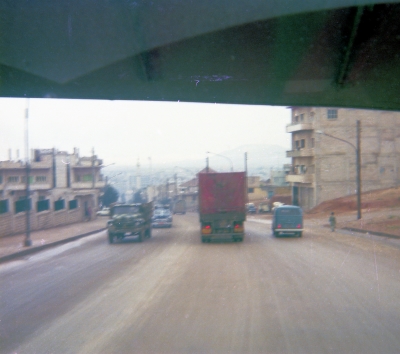
Down the hill into Hama City
‘From about eight in the morning until six at night.’ I replied. ‘That’s no f***ing good,’ he screamed, ‘you need to be driving sixteen hours a day on this job! I’ll have to have a word with your bosses.’
This destroyed any good feeling we’d had at the Oryx garage and felt unfair, since the major hold up had been from other directors of the firm and we’d done much better without them! In the event, when we did eventually arrive home, nobody quibbled about that long trip to Istanbul.
The weather deteriorated gradually through Syria. The main road ran straight through the middle of Hama and Homs and became dual carriageway for about the last 30 miles down into Damascus. The Golan Heights were on our right, scenes of recent fighting with Israel. However, I guess the gun emplacements were on the other side, I couldn’t see any signs of activity.
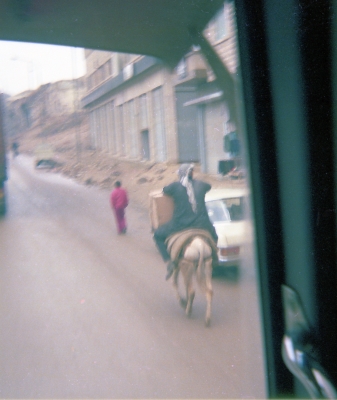
Syrian riding donkey uphill, Hama City
John took us to Sammy ‘I am very good agent’ Sirissi’s office, then headed off for Qatar. Sammy was arranging our final clearance. We asked him to telex our office to see if any back load had been arranged. Every time we asked him – over the course of several hours, he would peck at the telex keys for a second or two then go back to whatever he was doing. Being used to instant connection in Europe, we couldn’t figure out what he was doing – why didn’t he just send the bloody message? Eventually he explained that there was no live link and it could (and did) take several hours for the transmission to go, then receive a reply.
We expected to be told to head for Ordu. This was a town on the Black Sea, about 250 miles North West of Ankara. The hazelnuts in Cadbury’s and Mars chocolates came from Ordu. Most of the Astran drivers seemed to load there. One driver told us that when he’d loaded there, he’d been given a big bag of nuts for himself. He worked his way through them on the journey back. When he got to Mars at Slough, they told him that the first thing they did with the nuts was to fumigate them to kill the weevils. He said he felt ill whenever he thought of it!
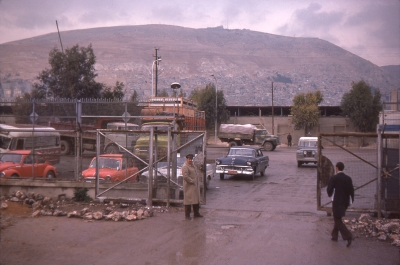
Customs compound, Damascus Syria
Another popular return load, in season, was melons from Yugoslavia. If any were bulging the tilt sides, the friendly Gestapo officers at the train wouldn’t let you on. The way of dealing with this was to smack the side of the tilt with a plank until it bulged no more! Happy days.
Eventually, we found out that we would be loading cotton for Belgium at Adiyaman, a hundred or so miles into the mountains of central Turkey. Meanwhile Sammy, a Palestinian, told us what a good man Hitler had been and, again, what a very good agent he was. He took us to the customs and relieved us of as much money as he could manage, then told us that we were clear to go back to Homs and unload.
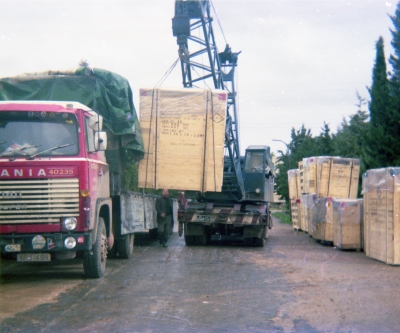
John West unloading at radio and tv station, Homs, Syria
At Homs, the man in charge of unloading us was Japanese. He wore a yellow hard hat and looked a little like Mr Spock off Star Trek. The Japanese were building the Television Station. We were brought cups of ‘chai’ at regular intervals. This was Lipton’s tea poured into little glass cups and turned into a saturated solution of sugar. I quite liked it. The Japanese man said ‘Huh, hundred ton sugar.’
After unloading we headed back north. Somewhere along the way we came across another Lad called Brett, driving a Volvo. He was also loading at Adiyaman, so we travelled with him. Brett was a Londoner who had an opinion on everything and an amusing way of telling you about it. He stopped in a lay-by at one point, so we followed him in. He’d seen a dog eating a dead dog and wanted to show us. Gross!
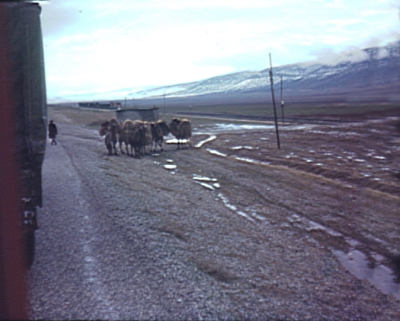
Camels & train nr. Gölbasi, southern Turkey
It was getting dark as we were getting nearer Adiyaman. Three soldiers waved us down and obviously wanted a lift. My soldier smoked continuously. He stubbed his first cigarette out on the plastic dash and obviously couldn’t understand my furious shouting at him, he just shrugged his shoulders.
Adiyaman was a bleak place. It may have been pretty in Summer, but certainly wasn’t in January. Brett Loaded first. They put steps up the back of the tilt and ran up and down them with huge bails of cotton. Andy and I were in my cab watching. Brett came across and hopped in. Andy was putting some waste paper into a rubbish bag.
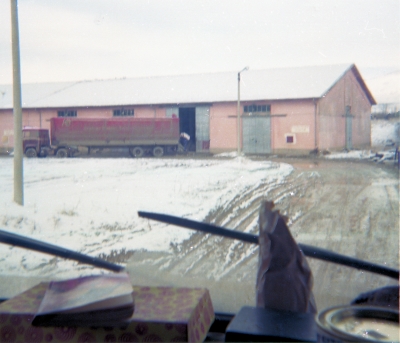
Turkish worker climbing steps into Andy’s tilt with cotton bale, Adiyaman, Turkey
‘Ere, what you doing?’ asked Brett. ‘Well, I was putting the rubbish in the bag to dispose of later’ replied Andy. ‘Give that here,’ he said grabbing the whole rubbish bag. He wound down the window and threw out the bag, the contents spilling out and being carried away on the vicious cold wind. ‘Arsehole of the f***ing world, Turkey.’ He announced.
When we were all loaded we were invited for coffee into the boss’s office while our paperwork was prepared. Not something that you could imagine happening in England! We were given small thimble like cups of black Turkish coffee, in which you really could stand the tiny spoon, it was very bitter. We tried to make small talk with the ‘Chef’ in his large office with a glass topped wooden desk. Considering his English was nil and our Turkish consisted of thank you very much (teshaykur ederim) and bread (ekmek) it was a bit stilted. Under the glass on his desk was a map of Europe and he signalled to Brett to come and show him where we were going.
Brett leaned over him and pointed out the route. ‘Your f***ing breath stinks’, he said, laughing as he said it. The Chef laughed too. I squirmed.
When we got back to the Oryx garage, another Londoner off Astran that Brett knew was there. We all had a meal together, camion stew, where we provided a tin each, a sort of early ‘Jacob’s Join!’ The Astran driver had a digital watch and they were quite new at the time. This thing did everything except brew the tea. We were shown every action in excruciating detail.
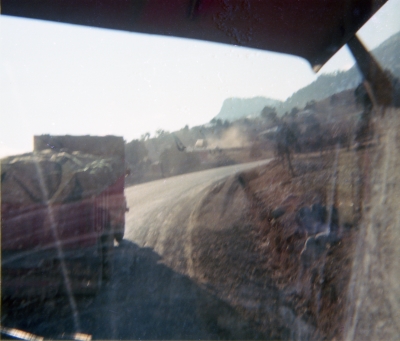
Climbing Tarsus, being overtaken by a Tonka
Next morning, Brett was still asleep when we were ready to go. We woke him, but he wasn’t interested, he’d had too many Efes Pilsens the night before. Andy and I weren’t prepared to wait, we pushed on. On Tarsus on one of the hairpins a Turkish artic insisted on coming around the bend towards us, even though Andy was half way round already. The result was a foot long tear in Andy’s tilt. The Turk, naturally didn’t even stop.
We stopped at the ‘Harem’ hotel in Istanbul. We couldn’t afford a room, but stayed on the car park. By now, we had almost run out of money. The truck washers who hassled you to death there insisted that they could do a professional repair on Andy’s tilt. The result was a piece of different coloured plastic tilt material glued over the tear. This caused us ‘Is nix gut TIR’ problems at every border thereafter!
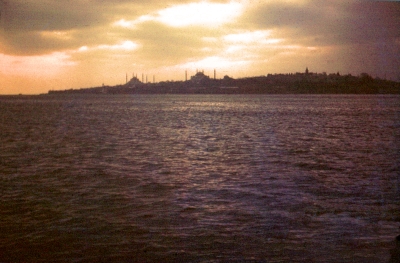
Istanbul from Harem Ferry
The truck washers wanted more money than we had for this repair, and we had nothing left for diesel or money changes, so we had to take a ferry across the Bosphorus and borrow some from the agent. Luckily Nodag’s credit was good!
In Bulgaria, because we weren’t with the ‘seasoned hands’, we missed the signs saying that trucks weren’t allowed in the city and went straight through Sofia. We stopped at a supermarket to buy some groceries. The shelves were empty apart from a big display of what appeared to be tinned grass. The butchery department had sausage, so we bought some of that.
When we had left England, there were stories on the news about fights in our supermarkets for sugar, which was in short supply. England would have been heaven to any Bulgarian – short supply in England meant 1lb instead of 2. In Sofia there was simply nothing to buy. When we came out we were in trouble with a trolley bus driver. Trying to get around our trucks, his pick-ups had come off the wires. He was stuck until we moved. He then used a long hooked pole to put the pick-ups back on the wires.
When we cooked the sausage that evening it was inedible. It seemed to consist of garlic and some sort of breadlike stuffing plus gristle. Nothing resembling meat. We threw it out of the cab for a marauding dog to eat. Even the dog turned its nose up at it.
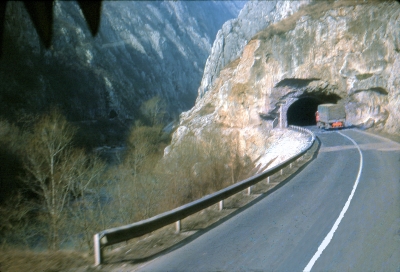
John near Nis, Yugo with GFV140N about to enter unlit tunnel
We were going back to England, the poor miserable Bulgarians lived like that every day of their lives. Even at the depths of recession, we were 1,000 times better off than the communist countries, although poor Bulgaria was one of the worst.
I never did go through Rumania, but Geoff and Ginger from Teeside, whom I met later, said that they felt so sorry for the Rumanians that they collected old clothes to take with them every trip thereafter, which were greeted with tears of gratitude.
As we threaded our way back through Prague, trying to avoid the trolley bus wires and the low bridges, we slowly went past a newspaper seller. When he saw our trucks, he started shouting, ‘Hey, English, Bobby Charrltonn, Bobby Charrltonn .’ We waved at him. He was still miming kicking a ball as he disappeared in the mirrors.
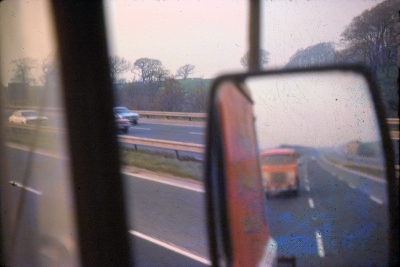
GFV & John in mirror and AW running home unit only on M6 northbound – photo water damaged
When we arrived at Aachen, the Belgian customs would not clear us to deliver. They told us it was cabotage, 3rd country delivery, and they wouldn’t allow it. Cabotage was one of the major sources of foreign currency for the state run trucking companies of the day, Hungarocamion, Romania and Bulgaria. Why they were allowed to get away with it and we weren’t, we didn’t know, but we were stuck.
Nodag eventually arranged for a Belgian trucker to empty and return our trailers. Actually, all he did was to take them down to the first lay-by and leave them for us to collect and empty ourselves in Antwerp!
I then loaded steel for Sheffield and Andy loaded empty aluminium cotton beams for Leicester. We didn’t make the same ferry, but met by chance when we took our tilts back to the hire company in Manchester, so we ran home together unit only, almost four weeks to the day after setting off.
Photos, John West and courtesy of Andy West.